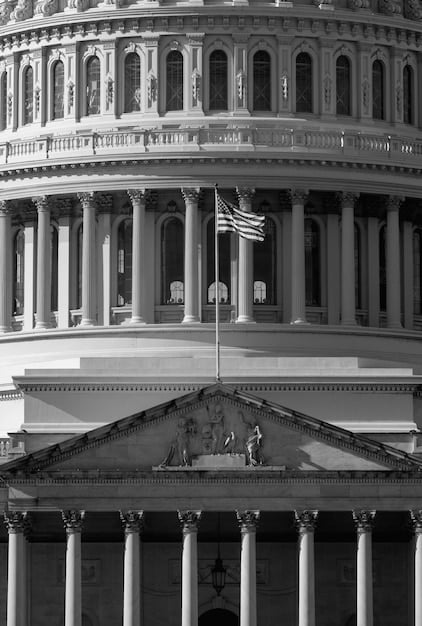Understanding the Impact of US Federal Data Privacy Regulations

Understanding the Impact of the Federal Government’s New Data Privacy Regulations on US Consumers is crucial for navigating the evolving digital landscape, as these regulations directly affect how personal data is collected, used, and protected, ultimately shaping consumer rights and business practices.
Navigating the digital age requires a keen understanding of data privacy, especially when federal regulations come into play. Understanding the Impact of the Federal Government’s New Data Privacy Regulations on US Consumers is no longer optional; it’s essential for protecting your personal information and ensuring your rights are respected. These regulations are designed to safeguard your data, but how do they actually work, and what do they mean for you?
The Current Data Privacy Landscape in the US
The United States has a unique approach to data privacy compared to other nations. Instead of a single, comprehensive federal law, the US operates under a sectoral approach. This means that different laws govern different types of data, such as healthcare information (HIPAA) or financial data (GLBA). This landscape can be complex and sometimes leaves gaps in consumer protection.
Sectoral Laws vs. Comprehensive Laws
The sectoral approach contrasts sharply with the comprehensive data protection laws seen in other parts of the world, such as the GDPR in Europe. While sectoral laws address specific types of data, they may not cover all aspects of personal information that consumers share online. This patchwork approach can lead to inconsistencies and confusion.
One major challenge with the sectoral approach is that it requires consumers to be aware of multiple laws and how they apply to their specific circumstances. This can be overwhelming, especially given the rapid pace of technological change and the increasing sophistication of data collection practices.

The Push for Federal Legislation
Recognizing the limitations of the current system, there’s a growing push for a comprehensive federal data privacy law. Advocates argue that a single, unified standard would provide stronger protections for consumers and simplify compliance for businesses. Several states have already enacted their own comprehensive laws, such as the CCPA in California, adding further momentum to the federal effort.
- A federal law could create a consistent national standard.
- It could simplify compliance for businesses operating across state lines.
- It could provide stronger enforcement mechanisms.
- It could enhance consumer trust in the digital marketplace.
The call for federal legislation is also driven by the increasing awareness of data breaches and privacy scandals. Consumers are becoming more concerned about how their data is being used and shared, and they are demanding greater control over their personal information. A federal law could address these concerns and restore confidence in the digital economy.
In conclusion, the current data privacy landscape in the US is characterized by a complex web of sectoral laws. However, the growing recognition of its limitations and the increasing consumer demand for stronger protections are fueling the push for a comprehensive federal law.
Key Provisions of the New Federal Data Privacy Regulations
The specifics of any new federal data privacy regulations are still under debate, but several key provisions are likely to be included. These provisions aim to address the core issues of data collection, usage, and consumer rights. Understanding these potential provisions is crucial for both consumers and businesses.
Data Minimization and Purpose Limitation
Data minimization is the principle that businesses should only collect the data they need for a specific, legitimate purpose. Purpose limitation further restricts how that data can be used. These provisions aim to prevent businesses from collecting excessive amounts of personal information and from using it for purposes that consumers did not anticipate.
For example, a retailer might collect your email address to send you receipts for your purchases. However, under data minimization and purpose limitation, they would not be allowed to share your email address with third-party advertisers without your explicit consent.
Enhanced Consumer Rights
Consumer rights are a cornerstone of any effective data privacy regulation. Key rights often include the right to access, correct, and delete personal data. The right to access allows consumers to see what data a business has collected about them. The right to correct allows them to fix any inaccuracies. The right to delete allows them to request that their data be erased.
- The right to access ensures transparency.
- The right to correct promotes accuracy.
- The right to delete gives consumers control.
- The right to portability allows consumers to transfer their data.
In addition to these core rights, some proposals also include the right to data portability, which allows consumers to transfer their data from one service to another. This can promote competition and empower consumers to switch providers more easily.
Mandatory Data Breach Notification
Data breaches are a serious threat to consumer privacy. Mandatory data breach notification laws require businesses to inform consumers when their personal data has been compromised in a breach. This allows consumers to take steps to protect themselves, such as changing passwords and monitoring their credit reports.

These laws typically specify the timeframe within which businesses must notify consumers, as well as the information that must be included in the notification. Some laws also require businesses to notify regulatory agencies, such as the Federal Trade Commission (FTC).
In summary, the new federal data privacy regulations are likely to include provisions on data minimization, enhanced consumer rights, and mandatory data breach notification. These provisions aim to give consumers more control over their personal data and to hold businesses accountable for protecting it.
How the Regulations Will Impact US Consumers
The implementation of new federal data privacy regulations will have a wide-ranging impact on US consumers. These regulations are designed to empower individuals and provide them with greater control over their personal information. Understanding these impacts is crucial for consumers to take full advantage of their rights.
Increased Transparency and Control
One of the primary goals of the new regulations is to increase transparency in data collection practices. Consumers will have a clearer understanding of what data is being collected, why it is being collected, and how it is being used. This increased transparency will be accompanied by greater control over their personal information.
Consumers will be able to access their data, correct inaccuracies, and request deletion. They will also have the right to opt-out of certain data collection practices, such as the sale of their personal information to third parties. These rights will give consumers more agency over their digital lives.
Reduced Risk of Data Breaches
The regulations will also impose stricter security requirements on businesses. Companies will be required to implement reasonable security measures to protect personal data from unauthorized access, use, or disclosure. This will help reduce the risk of data breaches, which can have devastating consequences for consumers.
In the event of a data breach, businesses will be required to notify consumers promptly. This will allow consumers to take steps to protect themselves, such as monitoring their credit reports and changing their passwords. The regulations will also provide for stronger enforcement mechanisms, including penalties for non-compliance.
Potential for Personalized Experiences
While the regulations aim to protect consumer privacy, they may also impact the personalized experiences that many consumers have come to expect online. Some businesses may need to limit the amount of data they collect, which could affect their ability to provide targeted recommendations and personalized content.
However, this does not necessarily mean that personalized experiences will disappear altogether. Businesses can still provide personalized services with consumers’ consent. The key is to be transparent about data collection practices and to give consumers the ability to opt-in or opt-out of personalized experiences.
In conclusion, the new federal data privacy regulations will have a significant impact on US consumers. They will increase transparency, enhance consumer control, reduce the risk of data breaches, and potentially impact personalized experiences. By understanding these impacts, consumers can make informed decisions about their data and protect their privacy in the digital age.
Challenges in Implementing the New Regulations
Implementing new federal data privacy regulations is not without its challenges. Both businesses and regulators will face hurdles in adapting to the new legal landscape. Understanding these challenges is crucial for ensuring the effective implementation of the regulations.
Compliance Costs for Businesses
One of the biggest challenges for businesses will be the cost of compliance. Companies will need to invest in new technologies, processes, and training programs to meet the requirements of the regulations. Small businesses may find it particularly difficult to afford these costs.
However, compliance should not be seen as a purely financial burden. By investing in data privacy, businesses can build trust with their customers and gain a competitive advantage. Consumers are increasingly concerned about data privacy, and they are more likely to do business with companies that they trust to protect their personal information.
Enforcement and Interpretation
Effective enforcement is essential for the success of any data privacy regulation. Regulators will need to develop clear guidelines and procedures for enforcing the regulations. They will also need to have the resources and expertise to investigate and prosecute violations.
Interpretation of the regulations can also be a challenge. The regulations may contain vague or ambiguous language that is open to different interpretations. This can lead to uncertainty and confusion for businesses. Regulators will need to provide clear guidance on how the regulations should be interpreted.
Balancing Privacy and Innovation
Another challenge is to strike the right balance between protecting privacy and promoting innovation. Data is a valuable resource for businesses, and it can be used to develop new products and services. However, data collection and use must be done in a way that respects consumer privacy.
- Encourage privacy-enhancing technologies.
- Promote data anonymization and pseudonymization.
- Foster a culture of privacy within organizations.
- Develop clear ethical guidelines for data use.
The regulations should not stifle innovation by imposing overly restrictive requirements. Instead, they should encourage businesses to find creative ways to use data while protecting consumer privacy. This requires a collaborative approach between regulators, businesses, and consumers.
In summary, implementing the new federal data privacy regulations will present several challenges, including compliance costs, enforcement, interpretation, and balancing privacy with innovation. Overcoming these challenges will require a concerted effort from all stakeholders.
The Role of Technology in Data Privacy
Technology plays a dual role in data privacy. On one hand, it enables the collection and use of vast amounts of personal information. On the other hand, it provides tools and techniques for protecting that information. Understanding the role of technology is essential for navigating the data privacy landscape.
Privacy-Enhancing Technologies
Privacy-enhancing technologies (PETs) are designed to protect personal data and minimize the risk of privacy violations. These technologies include encryption, anonymization, pseudonymization, and differential privacy. Encryption scrambles data so that it cannot be read by unauthorized parties. Anonymization removes identifying information from data. Pseudonymization replaces identifying information with pseudonyms. Differential privacy adds noise to data to protect the privacy of individuals.
These technologies can be used to protect data at rest, in transit, and in use. They can also be used to enable privacy-preserving data analysis, which allows businesses to gain insights from data without compromising individual privacy.
The Internet of Things (IoT) and Data Privacy
The Internet of Things (IoT) is a network of interconnected devices that collect and exchange data. These devices include smartwatches, smart home appliances, and connected cars. The IoT raises significant data privacy concerns because it involves the collection of vast amounts of personal data, often without consumers’ explicit knowledge or consent.
To address these concerns, it is important to implement strong security and privacy measures in IoT devices. This includes encrypting data, providing clear privacy policies, and giving consumers control over their data. It is also important to educate consumers about the privacy risks associated with IoT devices.
Artificial Intelligence (AI) and Data Privacy
Artificial intelligence (AI) is increasingly used to analyze and process personal data. AI can be used to personalize services, detect fraud, and improve efficiency. However, AI also raises data privacy concerns. AI algorithms can be biased, discriminatory, and opaque. They can also be used to infer sensitive information about individuals.
- Ensure AI algorithms are fair and unbiased.
- Make AI algorithms transparent and explainable.
- Give consumers control over the use of AI for their data.
- Develop ethical guidelines for AI development and deployment.
To address these concerns, it is important to develop ethical guidelines for AI development and deployment. These guidelines should ensure that AI is used in a way that respects consumer privacy and promotes fairness and transparency.
In conclusion, technology plays a critical role in data privacy. By using privacy-enhancing technologies and addressing the privacy challenges associated with IoT and AI, we can harness the power of technology while protecting consumer privacy.
The Future of Data Privacy Regulations in the US
The future of data privacy regulations in the US is uncertain, but it is clear that the issue will continue to be a top priority for policymakers and consumers. Several trends are likely to shape the future of data privacy in the US. Understanding these trends is crucial for anticipating and preparing for the future.
The Potential for a Federal Privacy Law
As mentioned, there is growing momentum for a comprehensive federal data privacy law. Such a law would provide a consistent national standard for data privacy, simplifying compliance for businesses and enhancing protections for consumers. The specifics of any federal law are still under debate, but it is likely to include provisions on data minimization, enhanced consumer rights, and mandatory data breach notification.
A federal privacy law would also address the issue of preemption. Preemption refers to the ability of federal law to override state laws. If a federal privacy law is enacted, it could preempt state laws, creating a uniform national standard. However, some states may argue that their laws provide stronger protections for consumers and should not be preempted.
The Influence of International Regulations
International data privacy regulations, such as the GDPR in Europe, are likely to continue to influence the development of data privacy regulations in the US. The GDPR has set a high standard for data privacy, and it has inspired similar legislation in other countries. US policymakers may look to the GDPR as a model for federal privacy law.
However, the US is unlikely to adopt the GDPR wholesale. The US has a different legal and cultural context, and US policymakers may choose to take a different approach to data privacy. They may also want to avoid imposing overly burdensome requirements on businesses.
The Evolving Role of the FTC
The Federal Trade Commission (FTC) has historically played a leading role in enforcing data privacy laws in the US. The FTC has the authority to investigate and prosecute companies that engage in unfair or deceptive trade practices, including violations of data privacy laws. The FTC has also issued guidance and recommendations on data privacy best practices.
The FTC’s role in data privacy is likely to evolve in the future. Congress may grant the FTC additional authority and resources to enforce data privacy laws. The FTC may also develop new enforcement strategies to address emerging data privacy challenges.
In conclusion, the future of data privacy regulations in the US is likely to be shaped by the potential for a federal privacy law, the influence of international regulations, and the evolving role of the FTC. By understanding these trends, we can anticipate and prepare for the future of data privacy in the US.
| Key Point | Brief Description |
|---|---|
| 🛡️ Data Minimization | Collect only necessary data for specified purposes. |
| ✅ Consumer Rights | Access, correct, and delete personal data as needed. |
| 🚨 Breach Notification | Mandatory notification after data breaches to protect consumers. |
| 🌐 Federal Law | Push for a comprehensive federal data privacy law in the US. |
Frequently Asked Questions
▼
Data minimization is the principle that organizations should only collect and retain the minimum amount of personal data necessary to fulfill a specific purpose. This helps to reduce the risk of data breaches and privacy violations, ensuring data is not kept indefinitely.
▼
You would likely have the right to access, correct, and delete your personal data held by organizations. Additionally, regulations may provide the right to opt-out of certain data processing activities, such as the sale of your data to third parties.
▼
A federal law would provide a unified and comprehensive standard for data privacy across the US, replacing the current fragmented approach. This would simplify compliance for businesses and offer consistent protections for consumers, regardless of their state of residence.
▼
Businesses will need to invest in new technologies, processes, and training programs to comply with data privacy regulations. They will also need to be more transparent about their data collection and processing practices and give consumers greater control over their data.
▼
The General Data Protection Regulation (GDPR) is a European Union law that sets a high standard for data privacy. It has influenced US data privacy regulations by serving as a model for comprehensive data protection and inspiring similar legislation worldwide.
Conclusion
Understanding the Impact of the Federal Government’s New Data Privacy Regulations on US Consumers is paramount in today’s digital era. While challenges exist in implementation, these regulations aim to empower consumers with greater control and transparency over their personal data, fostering a more secure and trustworthy digital environment.





